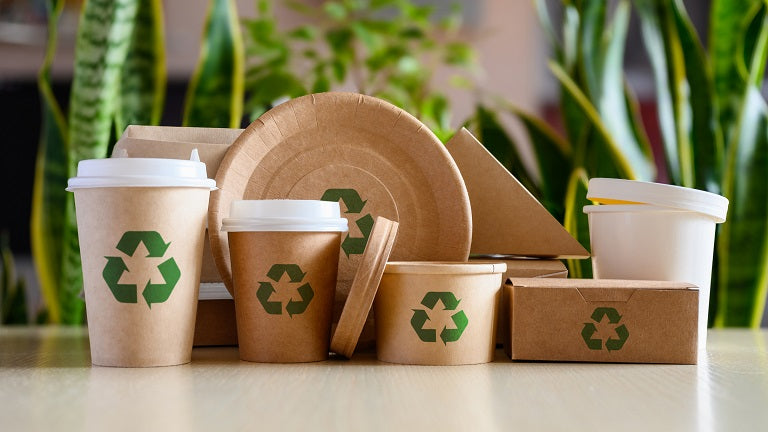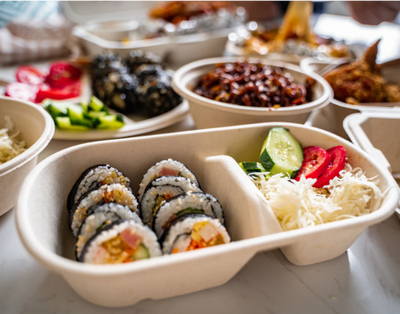Khi ngày càng có nhiều những sản phẩm thân thiện với môi trường xuất hiện trên thị trường, sản phẩm có thể phân huỷ hoàn toàn đã tạo được những dấu ấn nhất định, nhất là khi nó mang đến nhiều ưu điểm vượt trội so với sản phẩm phân huỷ sinh học thông thường (biodegradable products). Các sản phẩm phân huỷ hoàn toàn đang dần trở thành giải pháp thay thế hoàn hảo, nhưng liệu bạn có thực sự biết chúng hoạt động như thế nào? Trong bài viết này, chúng ta sẽ cùng khám phá vòng đời của các sản phẩm phân huỷ hoàn toàn, từ khâu sản xuất bền vững đến quá trình phân huỷ, và cách các sản phẩm phân huỷ của EQUO góp phần vào xu hướng tiêu dùng xanh này.
Sản Phẩm Phân Huỷ Hoàn Toàn Là Gì?
Trước khi tìm hiểu chi tiết về vòng đời của sản phẩm phân huỷ hoàn toàn, hãy làm rõ khái niệm này. Khác với nhựa thông thường có thể mất hàng trăm năm để phân huỷ, các sản phẩm phân huỷ hoàn toàn được thiết kế để tự nhiên phân rã thành các chất hữu cơ, bổ sung dưỡng chất cho đất và môi trường xung quanh. Chúng thường được làm từ nguyên liệu hữu cơ như cỏ, gạo, dừa, cà phê, hoặc mía, và có khả năng phân huỷ trong khoảng thời gian nhất định khi được xử lý đúng cách.
Phân Biệt Sản Phẩm Phân Huỷ Hoàn Toàn Và Sản Phẩm Phân Huỷ Sinh Học (Compostable vs Biodegradable)

Cần lưu ý rằng, thuật ngữ "phân huỷ hoàn toàn" khác với "phân huỷ sinh học." Mặc dù cả hai đều liên quan đến quá trình phân rã tự nhiên, nhưng sản phẩm phân huỷ hoàn toàn sẽ không để lại chất độc hại hay vi nhựa sau quá trình phân huỷ. Trong khi đó, các sản phẩm phân huỷ sinh học thường chỉ có thể rã ra thành các phân tử nhỏ hơn, như vi nhựa và để lại các chất ô nhiễm sau khi bị phân rã.
>> Đọc thêm về sự khác biệt giữa phân huỷ hoàn toàn và phân huỷ
Giai Đoạn 1: Quá Trình Sản Xuất Bền Vững Của Sản Phẩm Phân Huỷ Hoàn Toàn
Bước đầu tiên trong vòng đời của sản phẩm phân huỷ hoàn toàn chính là quá trình sản xuất bền vững. Giai đoạn này bắt đầu với việc chọn lựa nguyên liệu thân thiện với môi trường, đảm bảo các nguồn tài nguyên được sử dụng một cách hợp lý và không gây hại.
Nguồn Nguyên Liệu Tái Tạo
Các sản phẩm phân huỷ hoàn toàn thường được làm từ nguyên liệu thực vật như mía, bã cà phê, bã mía, hoặc lá cọ. Những nguồn nguyên liệu này được trồng và thu hoạch mà không gây ra tác động lớn đến môi trường, đảm bảo là tài nguyên tái tạo. Ví dụ, các sản phẩm của EQUO được sản xuất từ các nguyên liệu tự nhiên như mía và bã cà phê, không chỉ tái sử dụng phế liệu nông nghiệp mà còn giúp giảm thiểu rác thải.
Quy Trình Sản Xuất Tiết Kiệm Năng Lượng

Ngoài việc sử dụng nguyên liệu thân thiện, quy trình sản xuất cũng đóng vai trò quan trọng trong việc duy trì tính bền vững. Quy trình sản xuất của EQUO luôn chú trọng việc tiết kiệm năng lượng và giảm thiểu chất thải, đảm bảo sản phẩm không chỉ bền vững ở khâu vật liệu mà còn cả trong toàn bộ quy trình sản xuất.
Không Sử Dụng Hoá Chất Độc Hại
Khác với quy trình sản xuất nhựa truyền thống thường sử dụng hoá chất độc hại, các sản phẩm phân huỷ hoàn toàn được sản xuất theo phương pháp an toàn, không gây ô nhiễm môi trường. Điều này đảm bảo rằng sản phẩm của bạn không chứa hóa chất độc hại và hoàn toàn an toàn trong suốt quá trình sử dụng và phân huỷ.
Giai Đoạn 2: Giai Đoạn Sử Dụng Của Sản Phẩm Phân Huỷ Hoàn Toàn
Sau khi sản xuất, sản phẩm sẽ đến tay người tiêu dùng và bắt đầu giai đoạn sử dụng. Giai đoạn này quan trọng vì nó giúp định hình tác động thực tế của sản phẩm đối với môi trường.
Sử Dụng Trong Thời Gian Ngắn, Lợi Ích Dài Hạn
Phần lớn các sản phẩm phân huỷ hoàn toàn, như hộp đựng thực phẩm, ống hút, hoặc dao nĩa dùng một lần, được thiết kế để sử dụng một lần nhưng lại mang lại lợi ích lâu dài cho môi trường. Khi sử dụng, những sản phẩm này vẫn đảm bảo tính tiện lợi mà người tiêu dùng mong đợi, đồng thời giảm bớt sự phụ thuộc vào nhựa dùng một lần.
Ví dụ, ống hút và hộp đựng thực phẩm của EQUO là những lựa chọn thay thế tuyệt vời, thân thiện với môi trường. Chúng không chỉ tiện lợi mà còn đảm bảo không hề có nhựa, giúp bạn yên tâm rằng sau khi sử dụng, chúng sẽ không gây ra bất kỳ tác hại nào cho hành tinh.
Giai Đoạn 3: Quá Trình Phân Huỷ
Giai đoạn phân huỷ là một phần không thể thiếu trong vòng đời của sản phẩm phân huỷ hoàn toàn. Không giống như nhựa, mất hàng trăm năm để phân huỷ, sản phẩm phân huỷ hoàn toàn có thể phân rã hoàn toàn trong vòng vài tháng.
Sản Phẩm Phân Huỷ Như Thế Nào?
Khi được vứt bỏ đúng cách, các sản phẩm phân huỷ hoàn toàn sẽ phân rã dưới tác động của các yếu tố tự nhiên như nhiệt độ, độ ẩm và vi sinh vật. Quá trình này chuyển đổi sản phẩm thành phân hữu cơ, cung cấp dưỡng chất cho đất và cây trồng.
Phân Huỷ Công Nghiệp Và Phân Huỷ Tại Nhà

Không phải tất cả sản phẩm phân huỷ hoàn toàn đều có thể phân rã nhanh chóng trong mọi điều kiện. Một số sản phẩm, được dán nhãn là "phân huỷ công nghiệp," cần phải được xử lý trong các cơ sở ủ phân công nghiệp với điều kiện nhiệt độ và độ ẩm kiểm soát. Tuy nhiên, các sản phẩm của EQUO được thiết kế để có thể phân huỷ tự nhiên trong vòng 6-12 tháng ngay cả trong điều kiện ủ phân tại nhà.
Giai Đoạn 4: Trở Về Với Thiên Nhiên: Kết Thúc Vòng Đời
Giai đoạn cuối cùng trong vòng đời của sản phẩm phân huỷ hoàn toàn là trở về với thiên nhiên. Không giống như nhựa thông thường để lại hóa chất và vi nhựa gây hại, các sản phẩm phân huỷ hoàn toàn sẽ bổ sung dưỡng chất cho đất, giúp cải thiện hệ sinh thái.
Hoàn Thiện Chu Kỳ Xanh
Khi sản phẩm phân huỷ hoàn toàn quay trở lại đất, chúng đóng góp vào một vòng tuần hoàn bền vững, nơi tài nguyên được tái sử dụng và rác thải được giảm thiểu. Quá trình phân huỷ giúp cải thiện chất lượng đất, thúc đẩy sự phát triển của cây trồng và giảm thiểu nhu cầu sử dụng phân bón hóa học.
Vì Sao Nên Chọn Sản Phẩm Phân Huỷ Hoàn Toàn Của EQUO?
EQUO cam kết tạo ra những sản phẩm thân thiện với môi trường, đáp ứng các tiêu chuẩn bền vững cao nhất. Sản phẩm phân huỷ hoàn toàn của EQUO được làm từ nguyên liệu tự nhiên như mía, bã cà phê, và dừa, đảm bảo phân rã nhanh chóng mà không gây hại cho môi trường.

Lợi Ích Của Sản Phẩm Phân Huỷ Hoàn Toàn EQUO
- Phân huỷ trong vòng 6-12 tháng: Sản phẩm của EQUO phân rã hoàn toàn và bổ sung dưỡng chất cho đất mà không để lại chất độc hại.
- Nguyên liệu tái tạo: Các sản phẩm được làm từ nguyên liệu tự nhiên như mía và bã cà phê, tận dụng phế liệu nông nghiệp và giảm thiểu tình trạng phá rừng.
- Quy trình sản xuất an toàn: Không sử dụng hóa chất độc hại, đảm bảo an toàn cho người tiêu dùng và môi trường.
Hiểu về vòng đời của sản phẩm phân huỷ hoàn toàn giúp chúng ta có cái nhìn sâu sắc hơn về tác động của sản phẩm lên môi trường và cách lựa chọn tiêu dùng một cách thông minh. Từ sản xuất bền vững đến quá trình phân huỷ, các sản phẩm phân huỷ hoàn toàn là giải pháp thiết thực để giảm thiểu rác thải và bảo vệ hành tinh.
Khi lựa chọn các sản phẩm như ống hút, hộp đựng thực phẩm hay dao nĩa, hãy cân nhắc đến vòng đời của sản phẩm và chọn những sản phẩm thân thiện với môi trường như EQUO. Bạn sẽ đóng góp một phần không nhỏ vào việc bảo vệ Trái Đất và tạo nên một tương lai bền vững hơn.






